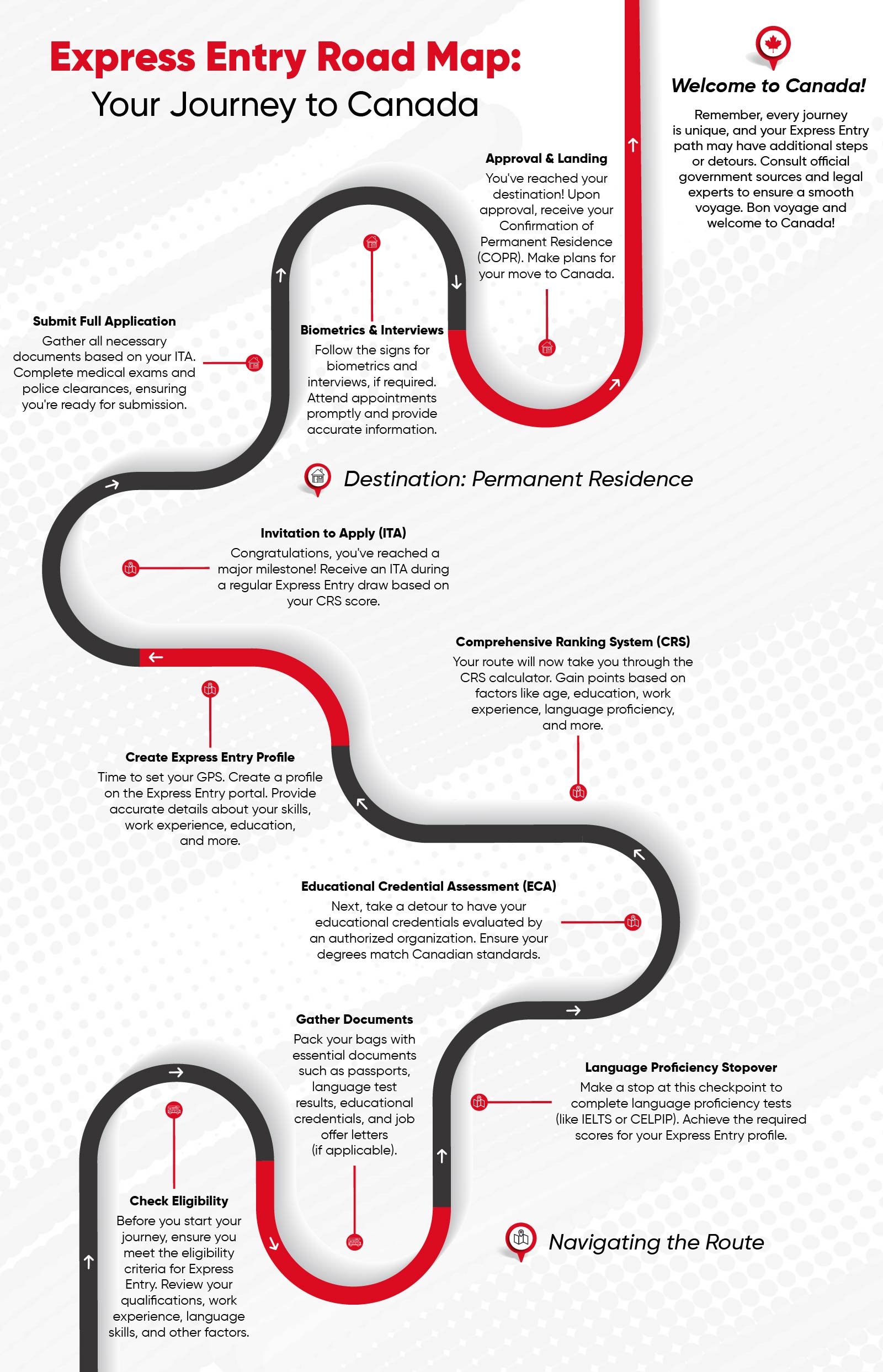Just like planning a road trip with countless routes and destinations, Canada's immigration landscape offers over 80 diverse visas and programs, each with its twists and turns. One wrong turn could lead to frustration. Let us serve you as your trusty GPS, guiding you through the intricate pathways of immigration possibilities. Join us as we navigate the twists, decode the signs, and unveil the hidden gems of Canada's immigration system. Let's chart a course to your dream life in the Great White North for you and your cherished family. Buckle up, and let's hit the road to your Canadian dreams!
Take The Fast Route: Express Entry to Canada

There are various direct routes to take to Canada. Which one you choose depends entirely on your circumstances and personal experience.
Canada’s Express Entry system was designed to help speed up the visa application process for skilled and experienced workers looking to move to Canada. The online management system has three immigration programs, each geared toward workers of different TEER Levels and work experience. These three programs are:
CRS Points
Canada’s Express Entry applicants are ranked according to the Comprehensive Ranking System (CRS). To enter an Express Entry draw, you’ll need a profile containing information about your:
- Age
- Language abilities (English and/or French
- Work experience
- Education/Qualifications
- Job offer (if applicable)
- Provincial Nominations (if applicable) and
- Ability to settle in Canada
Your profile will then be scored and entered into a draw pool with other applicants, and if your CRS score is over a predetermined number, you’ll get an Invitation to Apply (ITA) for permanent residency in Canada.
Take a look at some of the most popular direct Canadian immigration programs that function under the Express Entry System.
Federal Skilled Worker Program
Canada's Federal Skilled Worker Program (FSWP) helps highly skilled and experienced workers get permanent residence in Canada. The FSWP has a “pre-scoring system” that requires applicants to score at least 67 out of a possible 100 points before they can receive their CRS score.
| Requirements for FSWP | Details |
|---|---|
| Skilled Work Experience | Minimum 1 year of experience in managerial, professional, or technical/skilled trade job (TEER Level 0, 1, 2 or 3) |
| Language Skills | Proficiency in English/French - CLB/NCLC 7 |
| Education | Canadian high school/post-secondary degree or an Educational Credential Assessment (ECA) of foreign education |
| Proof of Funds | Demonstrate financial ability to support yourself and your family |
| Admissibility to Canada | Meet eligibility criteria for admissibility to Canada |
Federal Skilled Trades Program
Canada's Federal Skilled Trade Program (FSTP) helps skilled and experienced trade workers get permanent residence in Canada. To qualify to apply through this Express Entry Program, you’ll need to meet the following requirements:
| Requirements for Skilled Trade Immigration | Details |
|---|---|
| Language Abilities |
Reading & Writing - CLB/NCLC 4 Listening & Speaking - CLB 5 |
| Work Experience | At least 2 years of full-time work experience (or part-time equivalent) in a skilled trade within the last 5 years |
| Job Requirements | Meet the job requirements for your skilled trade |
| Job Offer or Certificate |
Valid job offer of full-time employment for at least 1 year, or Certificate of qualification in your skilled trade from a Canadian provincial, territorial, or federal authority |
You will also need to have experience or currently be employed in one of the following trades to qualify for the FSTP:
- Industrial, electrical, and construction trades
- Maintenance and equipment operation trades
- Supervisors and technical jobs in natural resources, agriculture, and related production
- Processing, manufacturing, and utilities supervisors and central control operators
- Chefs and cooks
- Butchers and bakers
The Canadian Experience Class
The Canadian Experience Class (CEC) helps skilled workers who have at least one year of Canadian work experience, in the last three years, apply for permanent residency. To qualify you’ll need to meet the following requirements:
| Requirements for Canadian Experience Class (CEC) | Details |
|---|---|
| Language Levels |
|
| Skilled Work Experience in Canada |
|
| Admissibility to Canada | Meet eligibility criteria for admissibility to Canada |
Provincial Immigration to Canada

The Provincial Nominee Program (PNP) was designed to help 11 of Canada’s 13 provinces and territories fill the labor needs of the region and help boost the economy.
To qualify to apply for permanent residency through a PNP, you would have to be able to show that you have relevant work experience and a job offer from a company in the province you are applying to.
Each province has its requirements and collectively has over 60 different streams or programs to choose from. Below are the participating provinces with PNPs.
Community and Region Driven Programs

There are various programs aimed at helping to develop and support smaller communities and regions in Canada. Two, in particular, have already helped thousands of newcomers make their way to Atlantic Canada and various rural regions in Ontario, Manitoba, Saskatchewan, Alberta, and British Columbia. These two programs are the Atlantic Immigration Program and The Rural and Northern Immigration Pilot.
Atlantic Immigration Program
Are you dreaming of a life removed from the hustle and bustle of big city centers, yet still with the same quality of life and job opportunities? Atlantic Canada may be the destination for you! And to make it just that much easier to get there, the Canadian government has created The Atlantic Immigration Program (AIP).
Originally a temporary pilot program, the AIP has recently been made a permanent immigration program due to its huge success. To qualify, you will need to meet the following criteria
- Have a high school certificate
- Have a valid job offer in one of the 4 Atlantic provinces (New Brunswick, Nova Scotia,
- Newfoundland & Labrador, Prince Edward Island
- Meet language requirements (minimum CLB 4)
- Have enough settlement funds; and
- Have graduated from a publicly-funded learning institution in the Atlantic region (minimum 2-year program).
Rural & Northern Immigration Program
The Rural and Northern Immigration Pilot helps skilled immigrant workers get permanent residency while assisting smaller communities in Canada to fill gaps in the labor market. The following communities are participating in the pilot programs:
- North Bay, Ontario.
- Sudbury, Ontario.
- Timmins, Ontario.
- Sault Ste. Marie, Ontario.
- Thunder Bay, Ontario.
- Brandon, Manitoba.
- Altona/Rhineland, Manitoba.
- Moose Jaw, Saskatchewan.
- Claresholm, Alberta.
- Vernon, British Columbia.
- West Kootenay (Trail, Castlegar, Rossland, Nelson), British Columbia.
| Requirements for Rural and Northern Immigration Pilot (RNIP) | Details |
|---|---|
| Work Experience or Education |
|
| Language Requirements |
|
| Educational Requirements |
|
| Proof of Funds | Prove you have enough money to support your transition into the community |
| Residency Intent | Intend to live in the community |
| Community-specific Requirements | Meet requirements specific to the participating community |
Occupation Driven Programs
Canada has two main sectors that are hugely in-demand of skilled talent: the agricultural, care provider, and tech sectors. Each industry has various programs that help skilled workers immigrate to Canada in their area of expertise.
Agri-Food Pilot
The Agri-food Pilot was created to help boost the agricultural sector, which is in great need of skilled workers in the following specialized areas:
- Meat product manufacturing
- Greenhouse, nursery, and floriculture production, including mushroom production
- Animal production, excluding aquaculture
| Requirement | Details |
|---|---|
| Work Experience | At least one year of non-seasonal full-time work experience in the last three years through a Temporary Foreign Worker Program. |
| Job Offer | Must have a permanent full-time job offer in a qualifying occupation. |
| Language Requirements | Must meet the language requirements of CLB4 (Canadian Language Benchmark 4). |
| Educational Qualification | Must have a Canadian high school diploma or an Educational Credential Assessment (ECA) if you have a foreign qualification. |
| Settlement Funds | Must have enough money to settle in Canada. |
| Temporary Resident Status | Must have maintained your temporary resident status if you are already in Canada. |
Home Care Provider Pilot
The Home Care Provider Programs are a gateway to permanent residency for both home care and childcare providers. There are two separate programs to apply through:
The Homecare Support Worker Pilot helps support workers get permanent residency in Canada.
The Homecare Child Care Provider Pilot helps childcare workers get permanent residency in Canada.
If you have more than 24 months of full-time work experience, you could qualify to apply directly for permanent residency, and your family can join you too. To qualify, you will need to meet the following requirements:
| Requirement | Details |
|---|---|
| Work Experience | At least 24 months of work experience in the last 36 months. |
| Language Requirements | Must meet the language level of CLB 5 in English or NLCL5 in French. |
| Education | At least 1 year of post-secondary education. An Educational Credential Assessment (ECA) is required if education was obtained outside Canada. |
| Admissibility | Must be admissible to Canada. |
The Canadian government has implemented structures to streamline the process of application for home care providers with less than 24 months of experience.
Business Immigration: Start-up Visa Program

For those looking to start a new or invest in an existing business venture in Canada, the Start-up Visa Program is ideal. You will need to meet various requirements to qualify for this program:
- Have a letter of support from a designated organization
- Have at least 10% voting rights
- Have more than 50% attached to outstanding shares (with the designated organization)
- Play an active role in the running of your business
- Be located in Canada
- Meet the minimum Canadian Language Benchmark (CLB) level 5
- Have enough settlement money to support yourself and your family.
Various provincial entrepreneur programs offer permanent residency to applicants looking to bring their business to a particular province or territory in Canada.
FAQs
How Much Money Do You Need to Immigrate to Canada?
Please see our table below that sets out the settlement fees required
| Number of Family Members | Funds Required (in Canadian dollars) |
|---|---|
| 1 | 13,757 |
| 2 | 17,127 |
| 3 | 21,055 |
| 4 | 25,564 |
| 5 | 28,994 |
| 6 | 32,700 |
| 7 | 36,407 |
| For each additional family member | 3,706 |
Can I Go to Canada Without a Job Offer?
Yes you can. Various programs don’t require a job offer. For example, The Express Entry system has two programs allowing you to immigrate to Canada without a job. The Federal Skilled Worker Program is one of them, and the other is the Federal Skilled Trades Program. (provided you have a certificate of qualification in your trade from a Canadian provincial, territorial, or federal authority).
What Qualifications Do You Need to Immigrate to Canada?
This depends on the immigration or visa program you are applying for. Although only one Express Entry program has education requirements, having a post-secondary education qualification can increase your Comprehensive Ranking System (CRS) score and therefore increase your chances of success.
Additionally, You may need an Educational Credential Assessment (ECA) to prove your foreign qualification meets Canadian standards. It involves an evaluation of your academic credentials by designated organizations to determine their equivalence in the Canadian education system. An ECA helps Canadian authorities, and employers understand the value of your foreign education, enabling you to make a smoother transition into the Canadian workforce and education system.




